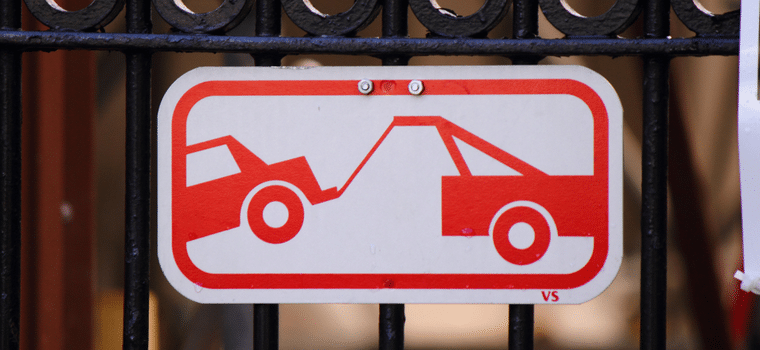Choosing to voluntarily surrender your vehicle instead of risking a non-voluntary repossession is still a loan default, and it will appear on your credit report for seven years. Because any type of repossession is a derogatory mark on your credit, your credit scores can suffer.
How Does a Voluntary Repossession Affect Credit?
Not only can a vehicle repossession result in a variety of derogatory marks on your credit, but the next time you apply for a car loan, you may be denied or pay very high interest to secure the loan. Here’s what you can expect to happen to your credit if you choose voluntary repossession:
1. Missed payments
Leading up to the voluntary repossession, you may have missed some of your scheduled payments. Those missed payments can ding your credit score and stay on your report for up to seven years.
2. Voluntary repossession
Even though you voluntarily surrendered your car, it’s still considered a repossession, which can be noted on your credit history for seven years.
3. Collection attempts
After you voluntarily surrender the vehicle to the lender, you might end up still owing money — even if the lender sells it to pay off your debt. The difference between what you owe on your contract and what your lender receives for selling it is called a deficiency.
If you can’t pay off the deficiency amount, the lender may transfer your debt to a collections agency. Collections accounts can appear on your credit report for seven years — even if you pay off the debt.
4. Court judgments
If there’s a deficiency amount, and you don’t pay it off, the lender or collection agency can sue you. A lawsuit may result in a court judgment ordering you to repay, which can also be noted on your credit record for seven years.
Benefits of Voluntary Repossession vs. Non-Voluntary Repossession
Although no lender likely views repossession as the preferred way to resolve a delinquent vehicle loan, choosing to surrender your vehicle can result in benefits that might not be available if you do nothing.
1. You may save money
When you voluntarily give up your vehicle, you can avoid having towing and storage fees that often occur during an involuntary possession tacked on to the debt you may still owe after the car is sold.
2. It could be less stressful
According to the Federal Trade Commission, once you have defaulted on your loan, most states have laws in place that allow the lender to attempt repossession efforts immediately — even coming to your home or your workplace to pick up the car.
During a voluntary repossession, you can arrange with your lender to surrender the vehicle. However, during an involuntary repossession, repo agents could potentially remove your car from you at an unexpected moment and leave you stranded.
3. Your credit may suffer a little less
Although a voluntary repossession still looks bad on your credit, there may be a silver lining. Your choice to voluntarily surrender the vehicle can be noted on your credit report. Then, future lenders can see that you were proactive in trying to deal with your obligation and may consider it a bit less negative than if the vehicle had to be repossessed against your will.
Ways to Get Your Car Back
After your car is repossessed, you may find yourself in a financial position to get it back. In some states, creditors are required to let you know if they are planning to sell your car at an auction or to a private buyer. Plus, depending on your state’s laws, the creditor may be required to let you know the date, time and location of the sale so that you can bid on your car if you want.
If your state’s laws permit it, you may also be able to buy back your car or reinstate your loan — but it may be expensive. The amount you may end up paying could include past due payments, the remaining balance on the loan and any expenses associated with the repossession.
Ways to Avoid Repossession
When making your car payment on time is impossible, letting your payment date come and go without taking any action isn’t the best move. No matter what, you still owe your creditor If you go without paying for too long, they will take action Rather than risk repossession, here are some alternative options:
1. Call your creditor
Explain that you’re in a tough spot and not able to make a payment right now. Depending on your history with the creditor, they may be willing to work with you by deferring a payment or two or even restructuring your loan.
2. Sell your vehicle
Selling your vehicle to pay off your loan might be an option if you don’t think you’ll be able to catch up on your payments. But you’ll have to pay off the loan in order to clear the lien on the vehicle. Otherwise, you won’t be able to transfer the title of your vehicle to the person who buys it.
This strategy works best if your car is worth as much or more than your loan balance, so you won’t have to come up with the money to pay the deficiency.
Monitoring Your Credit
Almost every action you take regarding your credit can affect it, but you may not know your scores or credit reports have changed if you’re not monitoring your credit activity with a product such as ScoreSense.
ScoreSense provides users with credit reports and scores from not one, but all three credit reporting agencies. It also includes periodic alerts and monitoring, which can help you stay informed about changes regarding your credit.
If you aren’t monitoring your credit already, what’s keeping you from getting started? Let us know in the comments.




